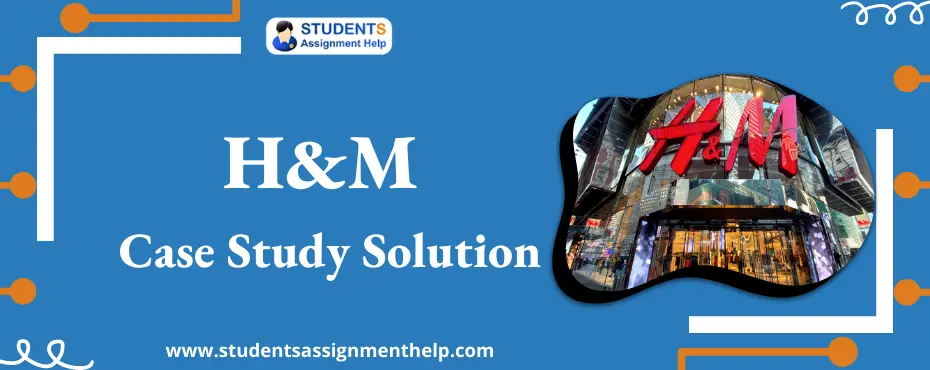H&M Case Study Solution

H&M is a fashion clothing retailer that runs its operation in Asia, North America, and Europe. Headquartered in Stockholm, Sweden H&M has about 68,000 employees in over 3500 outlets all over the world. The company collaborates with popular brands like Karl Lagerfeld, Roberto Cavalli, and Stella McCartney.
H&M develops its business by operating over channels like catalogs, the internet, and stores by offering a product mix that attracts the target audiences.
Flexible Rates Compatible With Everyone’s Budget
Hire a Professional Essay & Assignment Writer for completing your Academic Assessments
Key Facts of H&M
- Erling Persson founded H&M in 1947.
- It runs its business in over 55 countries and online shopping in 13 countries.
- H&M is the second-largest global fashion retail store after ZARA but leads the American Company Gap Inc.
- Karl-Johan Persson and Stefan Persson are the key personnel of the retail company. Brands acquired by H&M include COS, Weekday, Monki, and Cheap Monday.
Mission of H&M
- The company aims to provide its customers with high-quality products at prices that users find to be pocket-friendly.
- The company is conscious of social and environmental concerns.
- The company believes in giving back, getting indulged with the welfare of the society, and is connected to charities like UNICEF, Fashion against Aids.
- The company emphasizes product quality, so the products they sell meet the requirements of the customers.
- H&M is evolving consistently and figuring out ways to exceed the expectation of the consumers.
Vision of H&M
- The company aims at running the business in a way that’s considered to be socially, financially, and environmentally sustainable.
- The company wants to meet the requirements of both present and future generations.
- The company believes that quality is the key to success. With that inspiring thought in mind, they strive to deliver quality products to the customers.
Business Model of H&M
- H&M is a leading retailer of cosmetics, fashionable clothes, shoes, and accessories. for men, and women, teenagers and kids.
- H&M doesn’t own any factory, instead, it outsourced to suppliers and franchises.
- Costumes, shoes, and accessories get designed by the company’s in-house retailers.
- It has a target market share of 10% to 15%.
- Being connected to the Collection of Style, H&M offers a range of distinctive and evergreen trendy accessories.
- Monki Stores offer an incredible fashion experience marked by playfulness and vibrant graphical design.
Buy high-quality essays & assignment writing as per particular university, high school or college by UK, USA & Australian Writers
Acquisitions and Mergers
- Firstly, H&M acquired Cheap Money in 2008, which was previously owned by Fabric Scandinavian AB. Due to major online market drifts, it got closed down in June 2019.
- After acquiring Fabric Scandinavian, H&M launched the Online Stories, and COS to expand their business.
- They took over Selby as a makeshift to overseas market expansion, which corresponds with their aim to become fully circular.
- Afound caters to the customer’s recent interest in second-hand pieces of clothing, attempting to re-sell the excess stock from H&M 90s trends.
Corporate Strategy
The Corporate Strategy of H&M logistics depends on the overall scope and purpose of the business. Corporate Strategy evolves around providing high-quality products at affordable prices, ensuring that the company does something for society as well.
Business Strategy
Strategy is the long-term planning that helps a company to accomplish its objective. It helps to figure out the marketing plan that would help the business to achieve its goals. Reaching the overseas market is the objective of H&M. For instance, in 2015, the company opened more than 3500 in over 55 countries.
Marketing Mix
Place
- H&M manufactures clothes and exports them. Essential merchandise is made in Asia, while trendy and stylish apparel get manufactured in Turkey. Rather than owning the factories, H&M opts to claim outlets. The retailer has over 2,000 stores across the globe.
- In Europe, most of the merchandise gets shipped by rail. More than 90% of merchandise gets shipped using the road, rail, or ocean.
- Merchandise produced in Asia gets transported through, which saves a large amount. The realization of successful business ideas entirely depends on the distribution strategy of the company. Larenaudie(2004) states that lightning turnaround is the justification of the accomplishment of H&M.
Promotion
A company needs to identify and understand its target audiences, to develop a successful promotional strategy. The multi-channel promotional strategy formulated by H&M includes sales promotion, online advertising, and banners. As Jobber stated that promotion is a part of the marketing mix, so it should comply with the marketing strategy. As you can find from the posters, that accessories manufactured by H&M always follow the trend and price. H&M apparel and accessories always highlight the affordable price. It helps to improve brand awareness.
H&M’s future
For H&M stylish and quality are the key factors. They need better styling from ZARA, and for that, they need talented in-house staff. ZARA and H&M export their pieces of clothing to almost all European stores. To gain profits in a fast market, H&M needs to increase production, placing importance on quality and design.
They need to integrate closely with the supplier chain to boost their productivity, it could be a technological integration. For instance, integration like data transfer from one machine to the other.
It could be logistical. but it shouldn’t bear a tunnel vision or attempts to repeat the same thing time and again. It should shift its focus to places with growth potential like Shanghai, Brail
Stuck with a lot of homework assignments and feeling stressed ?
Take professional academic assistance & Get 100% Plagiarism free papers

